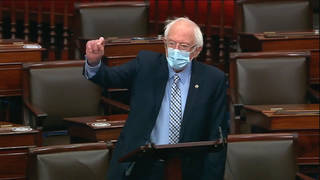
By Amy Goodman & Denis Moynihan
“We are live at the Wynn Resort in Las Vegas!” So opened the first Democratic presidential debate of the 2016 electoral season—that’s right, in a Las Vegas casino.
Five Democrats were given space on the stage at the casino: Former Secretary of State Hillary Clinton, Vermont Sen. Bernie Sanders, former Maryland Gov. Martin O’Malley, former Virginia Sen. Jim Webb, and former Rhode Island Gov. Lincoln Chafee. CNN, the network that hosted the debate, had a sixth podium at the ready, hoping that Vice President Joe Biden would jump into the ring in time to give its ratings a boost. He declined.
Democratic candidate Larry Lessig was available to use the extra podium, but he was banned from participating. Lessig is a Harvard professor and public intellectual who is running for president as a Democrat on a single-issue platform: the removal of money from politics. According to his campaign, Lessig raised $1 million in 28 days from close to 10,000 people, earned the support of voters from across the political spectrum, won 1 percent in the first national poll that his campaign conducted and spoke at the New Hampshire Democratic Party Convention with the other presidential candidates. Yet the Democratic National Committee has consistently ignored his candidacy. Chafee, by comparison, raised just under $28,000 in the first half of 2015.
Bernie Sanders has been the surprise candidate this year, attracting record-breaking crowds at campaign events, raising tens of millions of dollars in small donations and consistently rising in the polls against Clinton. He is a self-described socialist, which CNN’s debate moderator, Anderson Cooper, made an issue of from the start: “You call yourself a democratic socialist. How can any kind of socialist win a general election in the United States?”
Sanders does not shy from the label: “We’re going to win, because, first, we’re going to explain what democratic socialism is … it is immoral and wrong that the top one-tenth of 1 percent in this country own almost as much wealth as the bottom 90 percent, that it is wrong today, in a rigged economy, that 57 percent of all new income is going to the top 1 percent.”











Media Options